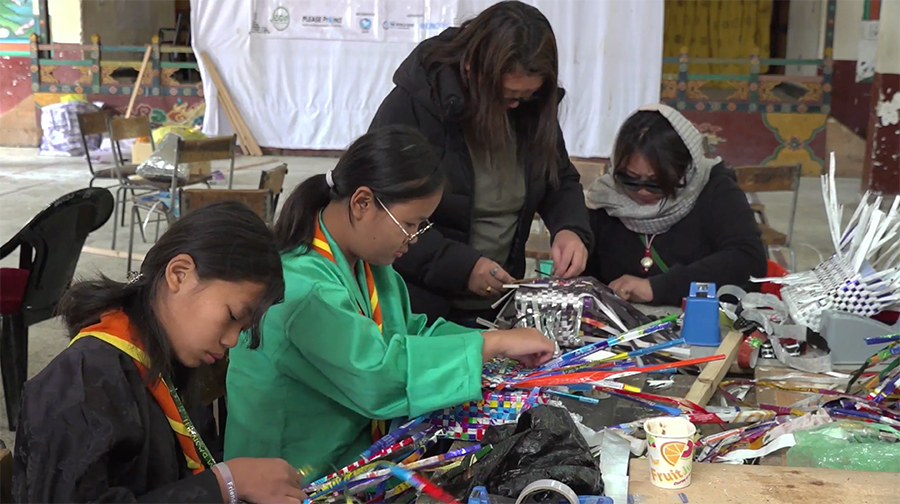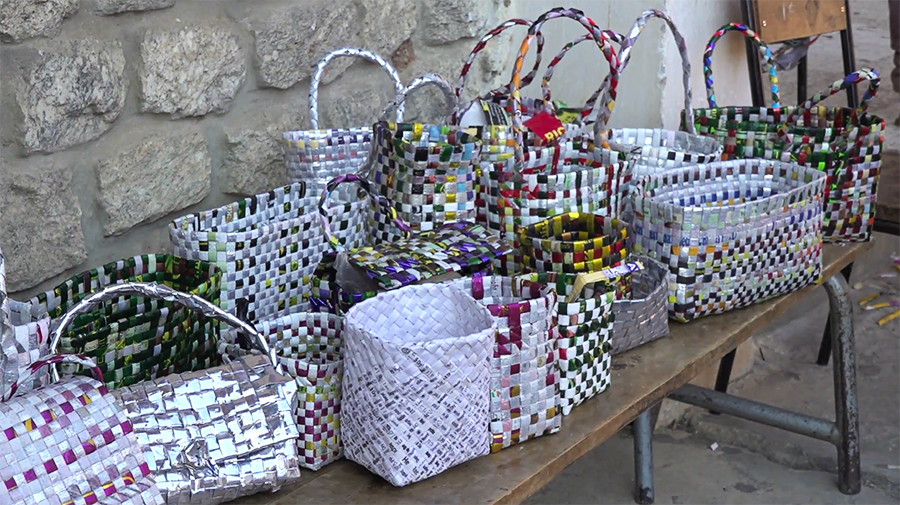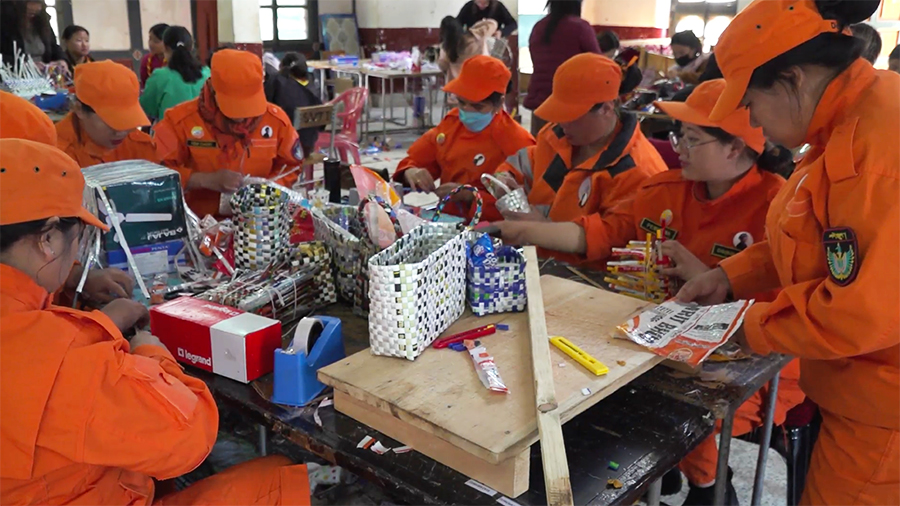 In most households, women play a key role in household consumption and recycling decisions, influencing the choice of plastic products and waste disposal methods. By shaping behaviour change and consumer attitudes, women can drive change across sectors. In Wangdue Phodrang, more than 40 participants, mostly women, are attending a week-long training on plastic waste management. The training focuses on waste segregation at the source and upcycling plastic into income-generating products.
In most households, women play a key role in household consumption and recycling decisions, influencing the choice of plastic products and waste disposal methods. By shaping behaviour change and consumer attitudes, women can drive change across sectors. In Wangdue Phodrang, more than 40 participants, mostly women, are attending a week-long training on plastic waste management. The training focuses on waste segregation at the source and upcycling plastic into income-generating products.
 35-year-old Pema Lhaden is attending such training for the first time where she is learning to transform plastic waste into useful items such as handbags and lunchbox baskets.
35-year-old Pema Lhaden is attending such training for the first time where she is learning to transform plastic waste into useful items such as handbags and lunchbox baskets.
As a stay-at-home mother of two, Pema sees this as a productive way to stay busy while generating income. She plans to sell plastic waste products like bags and baskets to support her family.
 “I realised that plastic waste should not be discarded carelessly from now on. Once we separate the biodegradable waste, there’s nothing we can’t do with plastic waste. Even a small piece of plastic can be reused. Similarly, even the packaging from junk food can be repurposed. Therefore, we will segregate plastic waste, and I will also encourage others to manage their plastic waste responsibly. Doing this can not only help us generate income but also contribute to keeping our environment clean if used properly.”
“I realised that plastic waste should not be discarded carelessly from now on. Once we separate the biodegradable waste, there’s nothing we can’t do with plastic waste. Even a small piece of plastic can be reused. Similarly, even the packaging from junk food can be repurposed. Therefore, we will segregate plastic waste, and I will also encourage others to manage their plastic waste responsibly. Doing this can not only help us generate income but also contribute to keeping our environment clean if used properly.”
 Likewise, other participants are equally excited and planning to manage plastic waste in their communities while generating income by turning it into useful products.
Likewise, other participants are equally excited and planning to manage plastic waste in their communities while generating income by turning it into useful products.
“Wherever we are, we have only focused on collecting waste, without understanding how to generate income from it. Until now, we have simply burned the waste and never realised its potential value. However, through this training, I have learned that segregating degradable and non-degradable waste can bring significant benefits,” said Rinzin Dorji, a participant.
“We, deSuups, help cleaning campaign every week on Wednesday. On average, we collect around one tonne of plastic waste even if we conduct weekly. Since we didn’t know how to utilise it, we have been collecting and disposing of dustbins. However, during this training, we learned about the benefits of plastic waste. We now understand its importance and value, especially since there are some serious issues related to plastic waste today,” said Yangchen Dema, another participant.
“Since many people are unaware of the benefits of recycling, they often litter plastic waste everywhere. Through this training, we learned that every piece of plastic can be used to create at least one product. Similarly, I plan to share this knowledge with my friends and parents in the future,” said Jigme Yeozer Dema, also a participant.
According to Eco Waste Solution in Wangdue Phodrang, over seven tonnes of waste are collected every day, nearly fifty per cent of which is plastic. The private company manages waste segregation at landfills in Wangdue Phodrang and Punakha.
“All the waste collected from Wangdue Phodrang is taken to the landfill. However, managing plastic waste at the landfill site is challenging because the wind scatters it everywhere, impacting the natural environment. This training would provide them an opportunity for their income generation and would encourage them to segregate their waste at the household level itself,” said Jigme Singye, Eco Waste Solution, Wangdue Phodrang.
Eco Waste Solution in collaboration with a private company called SHE-Cycle Solutions and with financial support from the World Bank and United Nations Office for Project Services is organising the weeklong training that ends tomorrow.
Meanwhile, according to the Organisation for Economic Co-operation and Development, OECD, global plastic production is projected to increase 70 per cent by 2040, reaching 736 million tonnes. Small initiatives like this training will play a vital role in managing plastic waste.
Changa Dorji, Wangdue Phodrang
Edited by Sonam Pem







